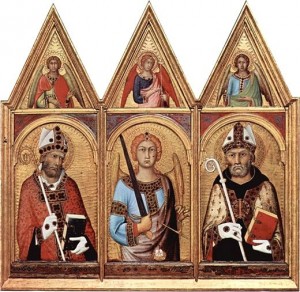 One aspect of the Catholic religion that many non-Catholics don’t understand is our devotion to the saints. Many of our ‘separated brethren’ can’t comprehend our veneration of the Roman Church’s holiest members. Some think that we worship them and regard us as idolaters. This isn’t true: we believe in one God which we profess every Sunday in the Creed, which includes the communion of saints. We pray to the saints and they pray for us.
One aspect of the Catholic religion that many non-Catholics don’t understand is our devotion to the saints. Many of our ‘separated brethren’ can’t comprehend our veneration of the Roman Church’s holiest members. Some think that we worship them and regard us as idolaters. This isn’t true: we believe in one God which we profess every Sunday in the Creed, which includes the communion of saints. We pray to the saints and they pray for us.
The saints are with Christ in heaven, sharing his glory and his love for the Church. Jesus communicated with Moses and Elijah, two Old Testament saints (yes, there are Old testament saints) at his transfiguration. Just as we ask our friends on earth to pray for us, especially those closest to Christ, so we ask the saints for their intercession.
The saints demonstrate how to follow the Lord and live spiritually. They have allowed God’s grace to produce a bountiful harvest in the vineyards of their souls, to use an image from Isaiah. “The vineyard of the Lord of hosts is the house of Israel, and the men of Judah are his cherished plants” (Is 5:7). How does your garden grow?
Saint Paul acknowledges this in his letter to the Philippians. He urges the members of the church to “keep on doing what you have learned and received and heard and seen in me. Then the peace of God will be with you” (4:9). By imitating Paul the Philippians were imitating Jesus. He is our ideal and the saints help us to obtain that ideal. They lived Christ-centered lives and we can too.
Ignatius of Loyola, the founder of the Jesuit order, was a Spanish knight but discovered the saints when he was injured in battle. There was nothing to read in the hospital except a biography about Jesus and a book about the lives of the saints. As he read, he thought, “If St Francis and St Dominic could live a spiritual life, then why can’t I?” Ignatius went on to became one of the most important servants of the Church during the late Middle Ages.
Ignatius discovered God’s plan by meditating on the saints and so can we. Choose a saint with whom you identify, learn about their lives, read what they wrote, and imitate their actions. You could start with the patron of your church. And that’s only scratching the surface. The Church’s deep tradition of the veneration of her saints ensures that there is no dearth of inspiration.
Padre Pio lived his entire life at the Franciscan friary San Giovanni Rotondo in Italy, yet he heard the confessions of famous actors, writers, and politicians, and counseled them through letters. Even from his cloister Padre Pio walked with them on their spiritual journey.
Holiness through devotion to the saints doesn’t diminish our humanity but enhances our divinity. Again, Paul to the Philippians: “The peace of God that surpasses understanding will guard your hearts and minds in Christ Jesus” (4:7). The Apostle believed this heart and soul because he spent many hours in prayer for the churches to which he ministered.
Holiness is God’s plan for us all. The most worthwhile goal of the Catholic Christian should be to become a saint by following the holy men and women who have gone before us. If they can do it so can we.



